
The Tor network hosts onion sites. The Tor network is a series of interconnected nodes that allow private and anonymous internet use. Tor stands for “The Onion Router,” while sites hosted on the service carry the “.onion” top level domain suffix.
You cannot access Tor services or onion sites using your regular browser. They’re part of the invisible part of the internet known as the deep web. Or, more precisely, they’re part of the Tor darknet. Darknets are the bits you hear about in the news; an allegedly lawless area of the internet where anything goes.
But if you cannot access onion sites using your regular browser, how do you do it? And moreover, why would you want to?
How Do You Access an Onion Site?
You can only access a .onion site through Tor. To access the Tor network, you need the Tor browser. The Tor browser is modified Mozilla Firefox browser with numerous integrated scripts and add-ons to protect your privacy while browsing onion sites.
The Tor browser is preconfigured to connect to the network, and the developers strongly advise not messing around with the browser settings unless you know what you are doing. Adding to that, the “know what you’re doing” is different to a regular browser, in that altering the Tor browser settings can expose your private browsing data to external sources.
Head to the Tor Project site and download the Tor browser. Head to the download location, find the Tor Browser folder and select Start Tor Browser. The browser immediately checks for updates. If there is an update, apply it.
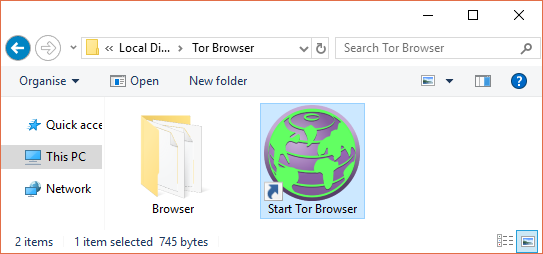
There are other browsers that focus on privacy and anonymity. Also, is Tor what you need, or would a basic VPN do the job?
A Quick Warning About Onion Sites
Onion sites, and darknets in general, can host some horrifying content. A large amount of it is fictional, but there is no doubt you can end up viewing potentially damaging and compromising material if you are not careful. Most of the truly awful bits are locked away behind paywalls, proxies within proxies, and addresses you won’t find printed anywhere.
There are those who would criticize websites for writing about such things—and Tor for enabling them. Tor’s Abuse FAQ provides a good defense, noting that:
“Criminals can already do bad things. Since they’re willing to break laws, they already have lots of options available that provide better privacy than Tor provides.”
Law enforcement already knows these areas of the Web exist—if not on Tor, they’d exist elsewhere. As the FAQ also notes, “Traditional police techniques can still be very effective against Tor.”
Read every description before you click any links!
How to Find Active Onion Sites
Google Search indexes the entire internet, one page at a time. Web crawlers (also known as a spider) are internet bots that systematically trawl through internet pages and index the content. Indexed content is found using a search engine.
The Tor darknet has similar indexing, though you won’t find those sites through Google. No, you need a special Tor search engine instead. Alternatively, there are numerous sites that curate lists of onion sites, such as The Hidden Wiki, and others that list indexed onion sites, such as the Onion Link List.
You must copy and paste the following links into the Tor browser, rather than your regular internet browser.
1. The Hidden Wiki
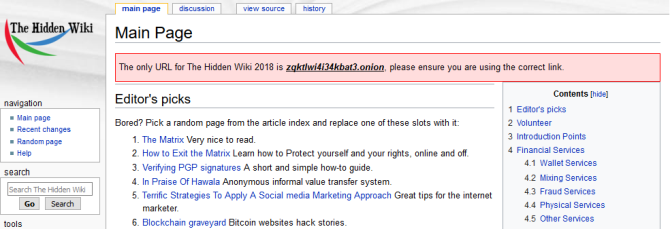
The Hidden Wiki is a general jumping off point for new darknet visitors. The linked address is correct for 2018. Older mirror versions of The Hidden Wiki exist but feature several outdated sites as well as broken links.
The Hidden Wiki contains links for cryptocurrency wallet services, secure messaging services, domain hosting services, darknet marketplaces, the darknet versions of popular social networks, various chans (like 4chan, but on Tor), and much more. It also has a long list of non-English language sites, too.
2. Deep Web Links – Dark Web Links
Another site using the “Hidden Wiki” name, but it isn’t the “official” site. It is, however, a very long list of onion sites. Unfortunately, it is difficult to verify how many of these sites are still up and running. Also, there’s a huge number of sites on this list I wouldn’t want to verify either, but it does have a description as to what each site is.
3. TORCH
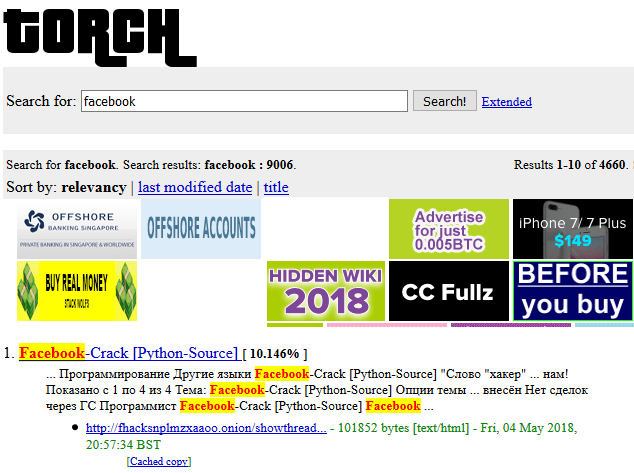
Torch is a well-known Tor search engine. However, it doesn’t work as a regular search engine. For instance, using TORCH to search for “Facebook” doesn’t return the Facebook onion site. Rather, it returns a long list of references to a Russian hacking forum. If you use Google to search for Facebook, you end up on the social media site.
4. Not Evil
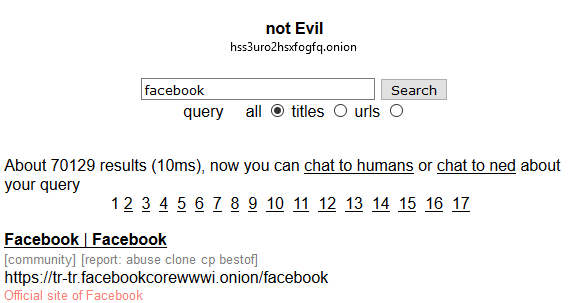
If TORCH doesn’t help you find what you want, try Not Evil. Not Evil works more like a regular internet search and is the successor to TorSearch (another Tor search engine) and the Evil Wiki (another listing site).
For instance, a search for “Facebook” returns the official Facebook onion site. A search for “Proton” returns the official Proton Mail onion site, and so on.
5. Daniel’s Onion Link List Raspberry Pi Directory
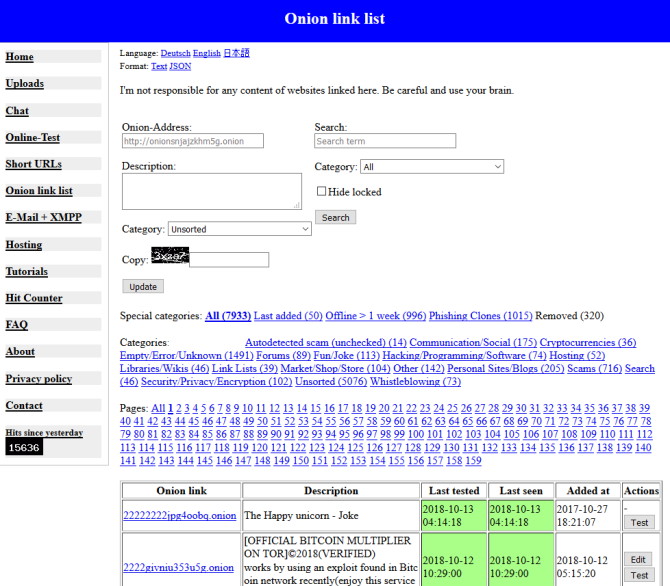
Daniel’s Onion Link List is a Tor directory hosted on Raspberry Pi. Cool, right? (Raspberry Pi’s have so many awesome uses!) The Onion Link List is an index directory that gives you a brief site description, the last seen and last tested dates, as well as when the onion site first hit the Tor network.
Now, Daniel’s Onion Link List does include every type of site, so carefully read descriptions before hitting links. Handily, the directory also slaps a “SCAM” label on any sites that will attempt to steal your information.
Be Safe When Browsing Tor and Onion Sites
Most darknet users will tell you the same thing: do not believe everything you hear. A huge amount of myth and infamy surrounds the Tor darknet. For the most part, it isn’t true. And if it is true, you don’t want to know about it, see it, and especially not click any link that takes you near it. Whatever “it” may be.
Tor hosts some interesting and actually useful sites, too. But if you have no idea what you are doing, check out our unofficial user’s guide to Tor.
Read the full article: How to Find Active Onion Sites (And Why You Might Want To)
Read Full Article
No comments:
Post a Comment